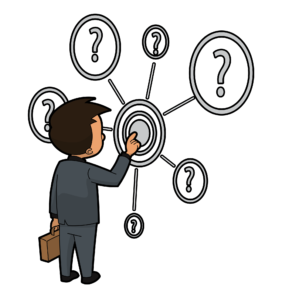But Things Were Going So Well
When we think of depression we often think of situational depression. That’s why we hear statements of shock such as “But things were going so well.”
You typically hear people say this, or something like it, after a loved one has ended their own life. They’re in shock and confused about what happened. After all, why would they choose now of all times?
Which just goes to show how little we understand what is really means to suffer from a mental health illness. External factors effect the sufferer differently when a mental health illness is in play. Their situation is not the cause, which means changes to their situation don’t cure it.

Situational Depression: The External Demons
Many of us relate depression to a depressing situation. For example, losing a loved one. This leaves us in grief. As can many other situations. For example, an inability to conceive, divorce, isolation, trauma, neglect or abuse. That’s why mental health sufferers can be dismissed as just missing some situational key. They’re not getting enough sunlight. They don’t have a job. A relationship broke down. And it’s true, these things can create situational depression.
So when things are going well, we assume they are going well. Relationships are progressing. Nothing particularly bad is happening. They’re doing good at their job. There is no situation or circumstance we can point to that is obviously causing despair.
The problem is that we are confusing situational “depression” with internal mental health illness. It’s not that situational depression isn’t bad. It is. It’s just that mental health illnesses are not the same thing.
Situational depression is a response to difficult, stressful, isolating, or traumatic life experiences. It’s a natural response to difficult external factors. These factors are putting pressure onto an individual’s ability to cope with or enjoy life.
Physiological mental health issues are different. That’s because these sort of struggles are not caused by external factors. Mental health illness exists independantly of external situations. However, external situations can still have an impact. Situations can directly impact their stability, even though they’re not actually the cause. For example, someone suffering from anxiety may find it even harder to cope if the house is a mess. Unfortunately, having a clean house won’t eliminate the problem.

Physiological Mental Health Issues: The Inner Demons
Imagine constantly fighting a war against your own stupid head. Unlike situational depression, it’s not just a phase to work through. When you are struggling with life issues there will come a time that things improve. For mental health illness there is an internal demon. This internal demon is constantly telling them that the world is better off without them. It tries to convince them that to live is to suffer and that they don’t deserve any of the good things that may randomly happen to occur.
Noone understands why you flake on a party or why you’re still in your pajamas mid-afternoon. Especially when you’ve just got a promotion at work and purchased your dream car. How can you be so ungrateful? Why can’t you just see the positives?
Inner demons are an inability to manage your thoughts and emotions in a normal, healthy manner. These demons result in different mental health diagnosis and come in many shapes. They engage in a constant war with the sufferer.

This can include:
Emotional Numbness:
This is typically diagnosed as depression. (Alone or comorbid with another diagnosis). It occurs when emotions are low or flat. You have no incentive, no motivation, no enjoyment in life. Not even the things that you would ‘normally’ love. Sometimes it can include a deep despair or sadness.
Emotional Mania:
This is when your emotions flip to the other extreme. You’re on an unstable high. Fast talking, fast acting, and over the top behaviours abound. They can even seem fun and make someone seem like the life of the party or the gung ho go getter. It usually involves an inability to exercise self-control. This often leads to poor judgement and decision making abilities. (Hence addictions, gambling, overspending, promiscuity, drugs or alcohol intake can be common). People experiencing mania tend to have an inflated sense of their own abilities and are often imbued with a burst of energy. This means they may achieve a lot in a short space of time. But then they will burnout quickly. It can be coupled with delusional ideas and memory lapses. Unfortunately this means the person may be unable to fully comprehend the effects of these phases on their own life.
Agitation:
Nervous excitement or anxiety. This causes physical and mental disturbances in thought and behaviour. The sufferer is often highly sensitive to what is going on around them. They can be overly irritated by noises, light, delayed gratification or other sensations.
Anxiety, panic and phobias:
This is when someone is plagued by intense feelings of worry or concern. They may have an extreme, irrational fear of something. Sufferers often describe themselves as constantly imagining the worst case scenario. This leaves them incapable of acting. Othertimes it’s an irrational emotional. Think of panic attacks. Sometimes these occur when someone is excessively worrying and getting themselves worked up. However these can also occur in an instant. Then it’s an overwhelming physical oppression. It’s a fear that leads to symptoms such as hyperventilation. A fight, flight, or freeze response is triggered, even when there is no real need for it.
Delusion:
Beliefs, impressions, understandings, sights, or sounds, that are not based in reality. Someone suffering from delusions will often be confused as to why they are the only person who can understand something. They may literally be seeing things or hearing voices that don’t make sense. Perhaps they understand they are experiencing delusional episodes. Or perhaps they don’t. When it’s not so obvious that their perception of reality has been twisted it can be hard. Hard for for them to face or accept this is happening. And hard for people around them to properly understand what they are going through.
And then some…
There are more, but these are some of the big guns. For people experiencing these challenges on a daily basis it hardly matters what it actually going on around them. They can be rich, popular, successful, and the life of the party. But it feels like the world is collapsing around them.

Don’t Confuse Mental Health Issues with Situational Depression
What’s the takeaway from all of this? It’s simple: Don’t expect people suffering from mental health issues to respond to situations the way you would. They can’t. Their brain just doesn’t work the same. Their emotions react differently and their thoughts respond irrationally.
It’s hard for people who don’t have mental health demons to battle to properly understand. At least, it can be. Strangely enough, it is sometimes harder for people who’ve been through situational depression to understand.
The problem with surviving situational depression
There are many otherwise mentally healthy people who’ve survived situational depression. They may have struggled for weeks, months, or even years. Then they found the key to breakthrough their situational based depression. Unfortunately this leaves many of them thinking they’ve found the solution… and they expect others to as well. It might be the old “fake it till you make it” adage that only works when you aren’t actually dealing with a lifelong illness. Or it could be the personal decision to just take control of your thoughts. Again, this is something that only works when you have a normal level of control over your own brain.
There are a lot of solutions that work really well for situational depression. Some of these solutions can even help people who are suffering from lifelong mental health disabilities. But they won’t cure them. Medication, counselling, support, and everyday decisions to keep fighting are always needed. The best we can do is help manage the illness.
Things can be going well. But for someone suffering from a mental health illness, this is just a tiny part of the picture. Sometimes good things can even have the opposite effect. Remember that many sufferers have a deep set belief that they don’t ‘deserve’ good things. Or perhaps they worry that things going well will inevitably lead to everything collapsing again. Unfortunately this means that things going well can even be a trigger and they need tools to manage the good times too.

Ongoing Support for Mental Health Illness
People who suffer from mental health illness have an illness that will probably plague them their entire lives. Some people suffer daily while others experience eposidic attacks. They may go through periods where they have it under control. However it is something they consistently have to manage. Improvements to their situation may help. Unfortunately mental health issues don’t get better just because their situation improves.
We may not understand what’s going on in someone’s head. Nor can we control it. All we can do is offer acceptance and support. In whatever capacity we have to give.
Written by Bekka Ruth.
Wife to a man who battles against bipolar and anxiety. Survivor of anxiety-based post-natal depression and situational depression.
Contact R&R Writing Services if you’d like assistance with writing or editing a blog for your own space.
If you’re in Australia and are experiencing suicidal ideation, contact Lifeline or another support service for 24 hour crisis support -13 11 14.

No responses yet